Hidden Signs of Vitamin B12 Deficiency
Vitamin B12 deficiency affects up to 20% of adults, with higher rates seen in older populations and those with dietary restrictions (source). The condition can quietly impact the nervous system, blood cells, and even mental health before obvious symptoms appear. Because early signs are subtle and easily mistaken for other issues, recognizing B12 deficiency presents a significant clinical challenge. Awareness of these hidden symptoms is vital for protecting long-term health across multiple organ systems.
1. Fatigue That Won’t Go Away

One of the earliest and most overlooked signs of vitamin B12 deficiency is persistent fatigue that doesn’t improve with rest. Vitamin B12 is essential for the production of healthy red blood cells, which are responsible for transporting oxygen throughout the body. When B12 levels are low, red blood cell production decreases, resulting in less oxygen reaching tissues and organs. This leads to a constant sense of tiredness and low energy, even after a full night’s sleep (source).
A real-world example is someone who, despite maintaining a healthy lifestyle and adequate sleep, still struggles to stay awake during the day or finds themselves unusually exhausted after light activity. This unrelenting fatigue can be mistaken for stress, overwork, or aging, causing many to ignore the warning signs.
If you notice ongoing fatigue that cannot be explained by changes in your routine or other medical conditions, it is important to consult your healthcare provider. Persistent tiredness, especially when accompanied by other subtle symptoms, may warrant blood testing to check for vitamin B12 deficiency and address the underlying cause before more severe complications develop.
2. Numbness and Tingling
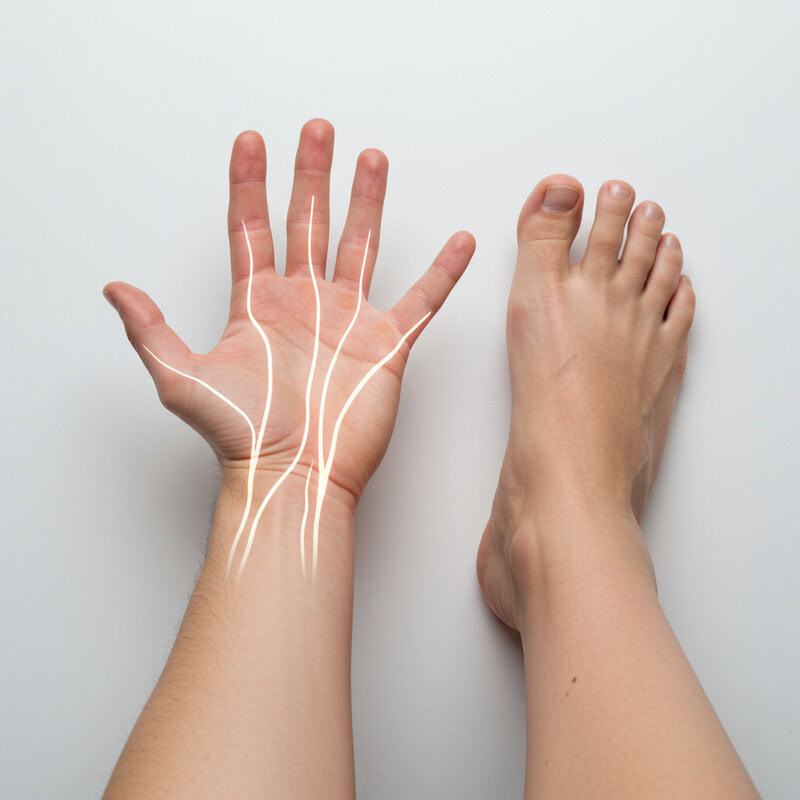
A lack of vitamin B12 can cause nerve damage, leading to sensations of numbness and tingling, often described as “pins and needles.” This symptom typically affects the hands, feet, arms, or legs and develops gradually as B12 is required for the maintenance of myelin, the protective coating around nerves (source). Without enough B12, nerves become vulnerable to injury, resulting in abnormal sensations known as peripheral neuropathy.
Numbness and tingling are also common in conditions like diabetes, where high blood sugar damages nerves. However, while diabetic neuropathy usually occurs after years of poorly controlled blood sugar, B12 deficiency-related symptoms can develop even in people without diabetes and may progress more rapidly if not addressed.
To distinguish B12 deficiency from other causes, pay attention to the onset and combination of symptoms. If numbness and tingling appear without known risk factors for diabetes or after dietary changes (such as adopting a vegan diet), B12 deficiency should be considered. Early recognition is crucial, as prolonged deficiency can cause permanent nerve damage. Consulting a healthcare professional and requesting blood tests are important first steps.
3. Memory Lapses
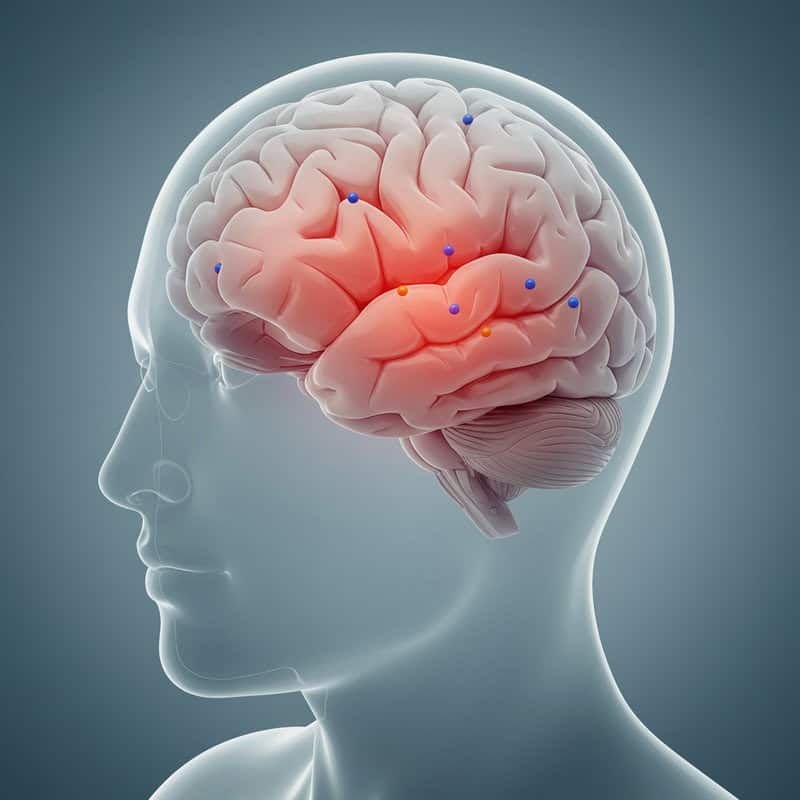
Vitamin B12 plays a crucial role in brain health, and its deficiency can cause subtle yet significant cognitive changes, including memory lapses. B12 is essential for the synthesis of neurotransmitters and for maintaining the integrity of nerve cells in the brain. When levels drop, you may begin to notice increased forgetfulness, trouble recalling recent events, or difficulty focusing. These cognitive changes may be mistaken for normal aging or, in some cases, may closely mimic the early stages of dementia (source).
Unlike the gradual and irreversible decline seen in Alzheimer’s or other dementias, cognitive symptoms caused by B12 deficiency can often be reversed with timely treatment. However, distinguishing between normal age-related forgetfulness, early dementia, and B12 deficiency can be challenging. Common signs to monitor include frequently misplacing objects, forgetting important dates, or struggling to find the right words during conversations.
If you or a loved one notice new or worsening memory problems—especially when accompanied by other symptoms like fatigue or numbness—it’s important to seek medical advice. Keeping a simple diary of memory lapses or mental “fog” can help your healthcare provider identify patterns and determine if further testing for B12 deficiency is needed.
4. Mood Changes
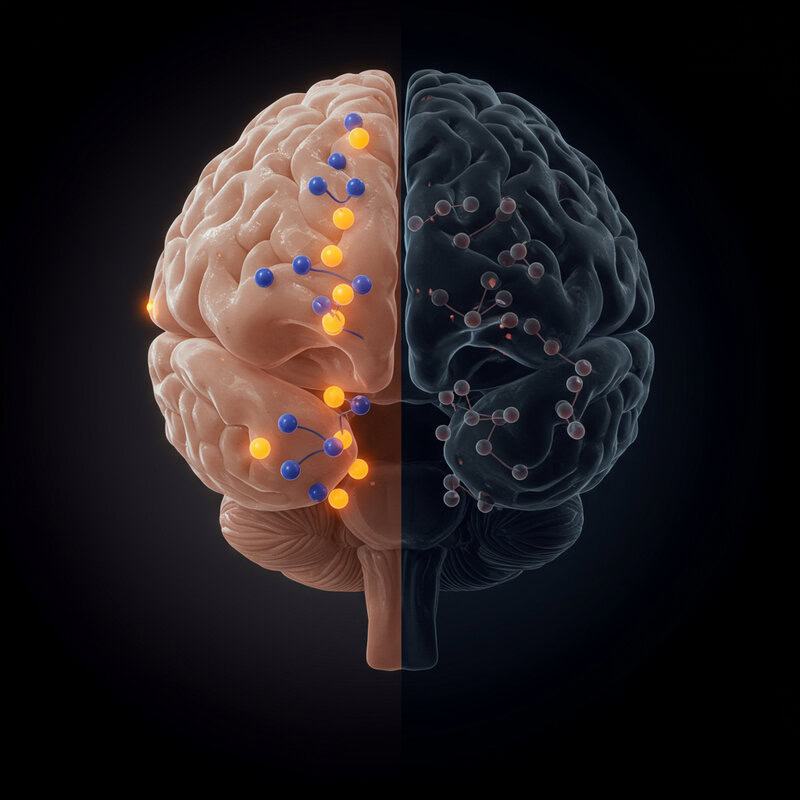
Vitamin B12 is integral to the production of neurotransmitters such as serotonin and dopamine, the chemicals responsible for regulating mood. When B12 levels are insufficient, the delicate balance of these neurotransmitters can be disrupted, leading to mood swings, increased irritability, anxiety, and even symptoms of depression (source). These changes can occur independently or alongside physical symptoms, making them easy to overlook or misattribute to life circumstances or mental health disorders.
A striking example is an individual who, after months of unexplained sadness, loss of interest in enjoyable activities, and frequent mood swings, is diagnosed with depression and prescribed antidepressants. However, their symptoms persist until a blood test reveals a vitamin B12 deficiency. Once B12 levels are restored through dietary changes or supplementation, their mood and outlook dramatically improve.
Because mood disturbances can be caused by numerous factors, it is important to consider B12 deficiency—especially if you have other risk factors such as a vegetarian or vegan diet, gastrointestinal issues, or a history of poor absorption. If new or worsening mood changes arise, discussing B12 testing with your healthcare provider may uncover an easily treatable underlying cause.
5. Pale or Jaundiced Skin
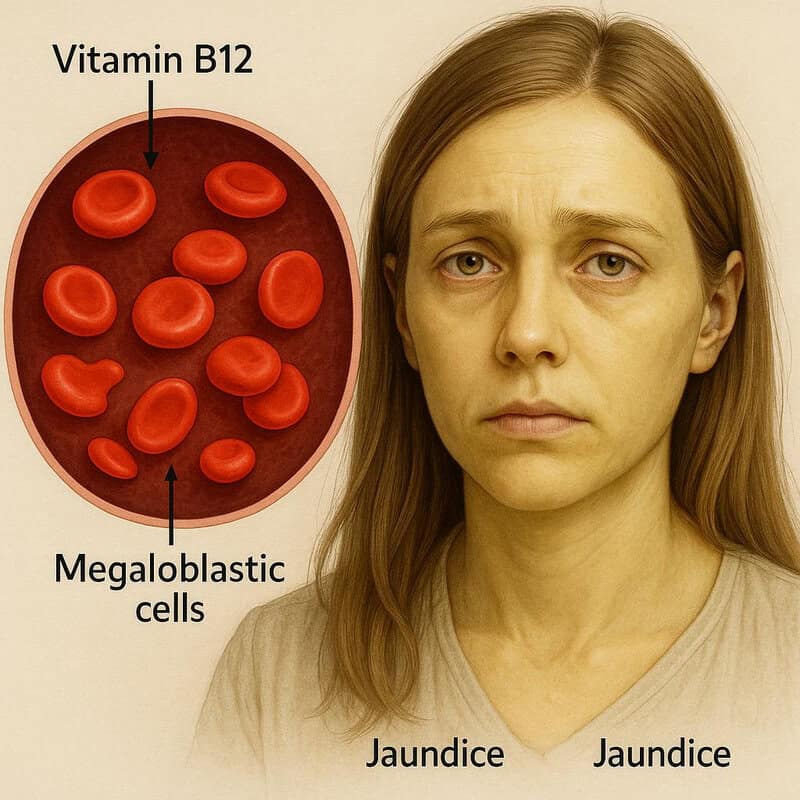
Vitamin B12 is vital for the production and maturation of red blood cells. When the body lacks enough B12, it produces fewer and larger red blood cells, a condition known as megaloblastic anemia. These abnormal cells are often too fragile to survive in the bloodstream, leading to their premature breakdown and a reduced overall red blood cell count. As a result, the skin may take on a pale appearance due to the diminished oxygen-carrying capacity of the blood (source).
In some cases, the rapid breakdown of red blood cells releases a pigment called bilirubin, which can cause a subtle yellowing of the skin and the whites of the eyes—this is known as jaundice. This symptom can be easily confused with liver conditions or other forms of anemia, such as iron deficiency anemia, which also causes pallor but usually does not result in jaundice.
If you notice that your skin has become noticeably paler, or if there is a yellowish tint to your skin or eyes, it is important to seek medical evaluation. These changes, especially when accompanied by weakness or fatigue, may be early warning signs of an underlying B12 deficiency that requires prompt attention.
6. Weakness and Dizziness

Vitamin B12 deficiency impairs the body’s production of healthy red blood cells, which are essential for delivering oxygen to tissues and organs. As oxygen transport declines, muscles and vital organs receive less fuel, resulting in persistent weakness and an increased likelihood of feeling lightheaded or dizzy, especially during physical activity (source).
Imagine someone who previously enjoyed jogging or brisk walks but now experiences sudden dizziness or even faintness during mild exercise. They may need to pause or sit down unexpectedly, or find themselves struggling with simple activities like climbing stairs. This weakness and dizziness often emerge gradually and can be mistaken for dehydration, low blood sugar, or general deconditioning.
Recognizing the pattern is crucial. If you notice that dizziness and weakness are triggered or worsened by physical exertion, and these symptoms persist despite rest and adequate hydration, it’s wise to consider possible vitamin B12 deficiency. Keep a log of when and how often these episodes occur, and share this information with your healthcare provider. Early intervention can help prevent further complications and restore your strength.
7. Shortness of Breath
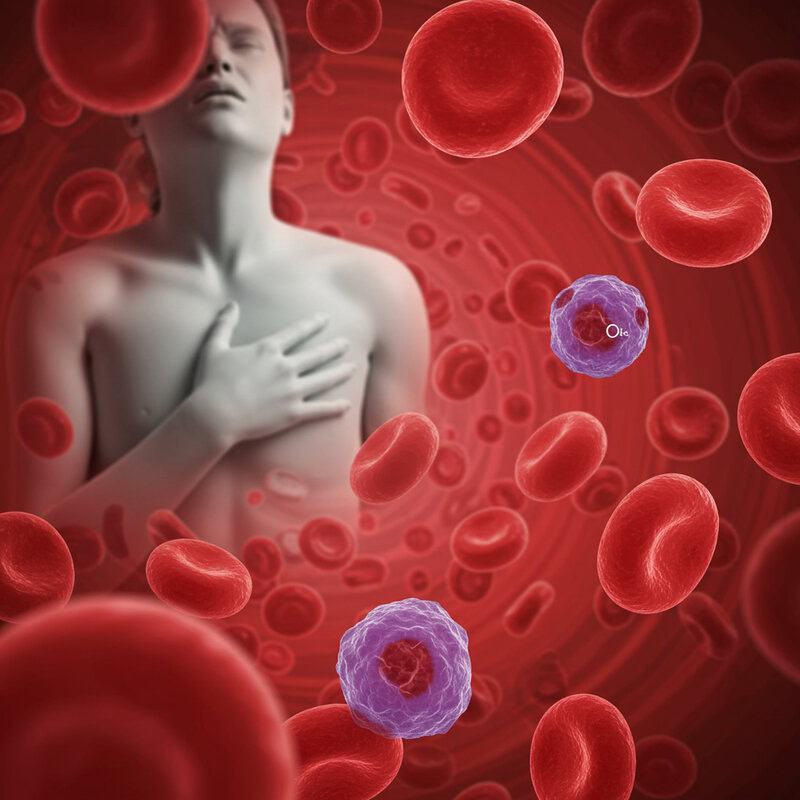
Vitamin B12 is essential for the formation of hemoglobin, the protein in red blood cells that binds and carries oxygen throughout the body. A deficiency in B12 leads to fewer and less efficient red blood cells, resulting in reduced hemoglobin levels and, consequently, less oxygen available for vital organs and tissues. This oxygen deficit often manifests as shortness of breath, particularly during physical activity or even at rest in more advanced cases (source).
Shortness of breath from B12 deficiency can sometimes be mistaken for asthma or other respiratory conditions. However, unlike asthma, which often includes wheezing and responds to inhalers or allergy medications, shortness of breath related to B12 deficiency is not accompanied by these classic respiratory symptoms. It is usually more persistent and not significantly relieved by rest alone.
If you find yourself unexpectedly winded after climbing stairs, carrying groceries, or during light exercise—especially if you do not have a history of lung or heart problems—it is wise to consider a blood test. Persistent or unexplained shortness of breath, when combined with other subtle symptoms, may indicate an underlying B12 deficiency that requires prompt attention and treatment.
8. Heart Palpitations
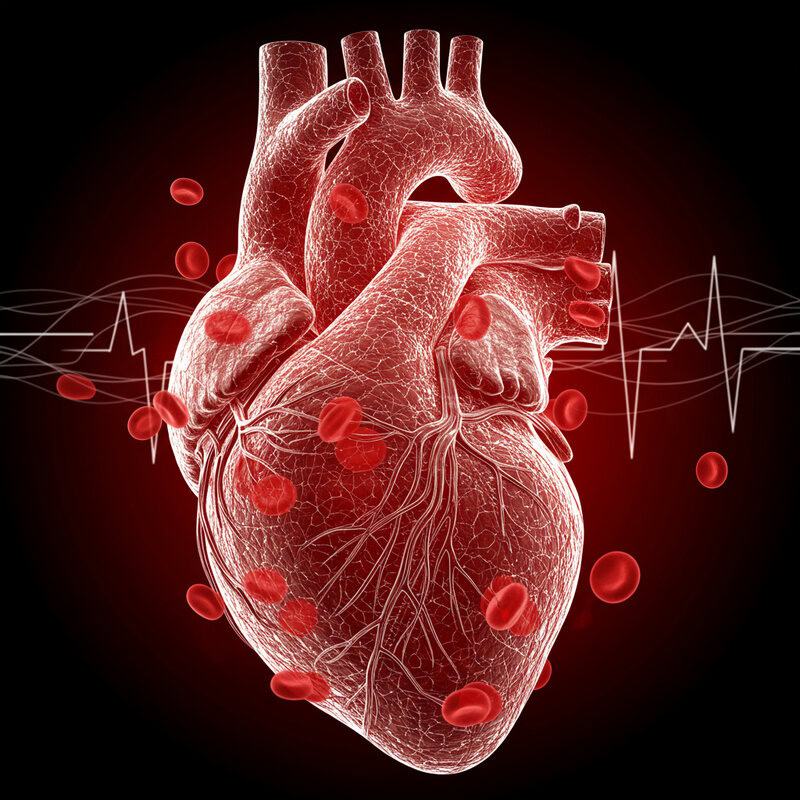
When vitamin B12 levels are low, the production of healthy red blood cells is compromised, reducing the amount of oxygen delivered to the body’s tissues. To compensate, the heart must work harder to circulate the limited oxygen, often resulting in heart palpitations—feelings of rapid, fluttering, or pounding heartbeats (source). This is the body’s attempt to maintain adequate oxygenation despite the shortage of efficient red blood cells.
An individual experiencing this symptom might notice their heart racing or skipping beats, especially during periods of mild exertion, emotional stress, or even while resting. For example, someone who feels their heart pounding after walking up a flight of stairs or while sitting quietly may not immediately connect these sensations to a nutritional deficiency.
Practical signs to monitor include a noticeably increased heart rate, irregular heartbeats, or a sensation of your heart “fluttering” without an obvious cause. These symptoms can be alarming and may sometimes be mistaken for anxiety or panic attacks. If you experience new or unexplained palpitations—particularly in combination with fatigue, dizziness, or shortness of breath—it is important to seek a medical evaluation and consider testing for vitamin B12 deficiency.
9. Vision Problems

Vitamin B12 deficiency can have a significant impact on the nervous system, including the optic nerve, which transmits visual information from the eyes to the brain. If B12 levels remain low for an extended period, the protective myelin sheath surrounding the optic nerve may become damaged, leading to a condition called optic neuropathy (source). This can result in blurred or disturbed vision, decreased peripheral vision, or even temporary vision loss in severe cases.
These visual disturbances can sometimes be confused with diabetic retinopathy, a diabetes-related complication that affects the blood vessels in the retina. However, diabetic retinopathy is typically associated with a history of diabetes and gradual vision changes, whereas B12-related vision problems may progress more rapidly and are linked to other neurological symptoms.
To recognize early warning signs, watch for sudden changes in the clarity of your vision, unexplained spots or shadows in your visual field, or difficulty seeing in low light. These symptoms may be subtle at first but can worsen if left untreated. If you develop new or unusual vision changes—especially alongside other warning signs of B12 deficiency—prompt medical evaluation and testing are recommended.
10. Unsteady Walking

Vitamin B12 plays a crucial role in maintaining the health of nerves, particularly those involved in movement and balance. When the body is deficient in B12, nerve fibers—especially in the legs—can become damaged, leading to impaired coordination and changes in the way you walk. This condition, known as ataxia, can manifest as unsteadiness, frequent tripping, or a sensation of heaviness in the legs (source).
Consider the case of an older adult who begins to notice they are stumbling more often, having trouble navigating stairs, or feeling unsure of their footing even on flat surfaces. These symptoms can be subtle at first and are often dismissed as a normal part of aging or attributed to joint problems. However, when these issues are caused by B12 deficiency, they may progress rapidly if not addressed.
To monitor for this hidden sign, pay attention to any changes in your gait, such as dragging your feet, a wider stance for balance, or difficulty rising from a chair. If you or a loved one notice these patterns—especially alongside numbness, tingling, or other neurological symptoms—it is important to consult a healthcare provider and consider vitamin B12 testing.
11. Sore, Red Tongue

One distinctive but often overlooked sign of vitamin B12 deficiency is glossitis—an inflammation of the tongue that results in swelling, redness, and pain. The surface of the tongue may appear smooth and shiny due to the loss of papillae, the tiny bumps that normally cover it. Individuals may also notice a burning sensation, increased tenderness, or difficulty eating and speaking (source).
Glossitis caused by B12 deficiency can be mistaken for other oral conditions, such as allergic reactions, viral infections, or irritation from dental appliances. Unlike canker sores or herpes simplex lesions, which are usually localized and may present as ulcers or blisters, glossitis tends to affect the entire tongue and is often accompanied by a general soreness or sensitivity.
To recognize this symptom, look for changes in the color and texture of your tongue, persistent discomfort, or cracks at the corners of the mouth (angular cheilitis), which sometimes occurs alongside glossitis. If you notice that your tongue is unusually red, smooth, or sore—especially if you have other signs of B12 deficiency—it is advisable to seek a dental or medical evaluation and discuss possible B12 testing.
12. Mouth Ulcers

Vitamin B12 deficiency can impair the body’s ability to maintain healthy cells in the mouth, leading to the development of painful mouth ulcers or canker sores. These ulcers are the result of reduced cell production and weakened immunity in the oral mucosa, making the tissue more vulnerable to irritation and slow to heal (source). The ulcers typically appear as small, round or oval sores with a white or yellow center and a red border, often on the inner cheeks, lips, or tongue.
Mouth ulcers can also occur in other conditions such as celiac disease, where immune reactions to gluten damage the lining of the digestive tract and lead to similar oral sores. However, in celiac disease, mouth ulcers are usually accompanied by gastrointestinal symptoms like diarrhea and abdominal pain. In contrast, B12-related mouth ulcers may occur without digestive complaints and are often seen alongside other signs of deficiency such as glossitis, fatigue, or numbness.
If you develop recurrent or persistent mouth ulcers—especially if they are accompanied by other unexplained symptoms—it is important to seek input from a dentist or healthcare provider. Blood tests can help determine whether a vitamin B12 deficiency or another underlying condition is to blame, allowing for targeted treatment and relief.
13. Pins and Needles in Feet

Peripheral neuropathy is a common neurological complication of vitamin B12 deficiency, often manifesting as a persistent “pins and needles” sensation in the feet and lower legs. This abnormal tingling occurs because B12 is essential for the production and maintenance of myelin, the protective sheath around nerves. When B12 levels drop, nerves become more vulnerable to damage, leading to sensations of numbness, tingling, and even burning pain, particularly in the extremities (source).
Consider the experience of an office worker who begins to notice a prickling feeling in their feet after sitting at their desk for long periods. Initially, they might attribute the sensation to poor circulation or uncomfortable footwear. However, as the symptom becomes more frequent and persistent, it interferes with daily activities, causing discomfort even while lying in bed or relaxing.
Early intervention is crucial to prevent permanent nerve damage. If you notice unusual tingling, numbness, or burning in your feet or hands—especially if it persists or worsens—it’s important to consult a healthcare provider. Prompt blood testing and treatment of B12 deficiency can reverse symptoms and protect long-term nerve health, making vigilance and timely action essential.
14. Ringing in the Ears (Tinnitus)
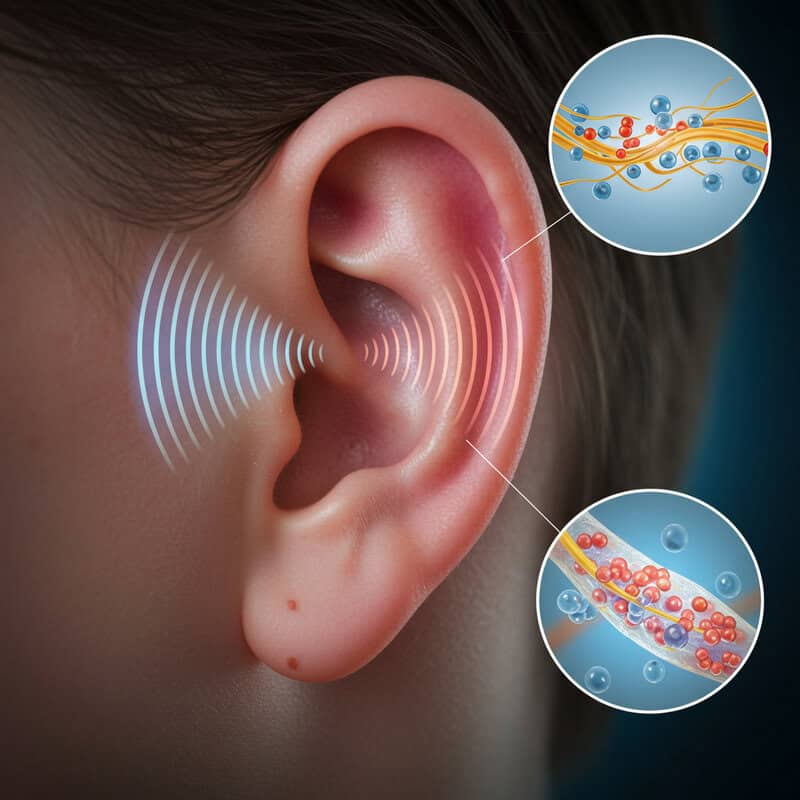
While not as common as other neurological symptoms, some studies have suggested a possible link between vitamin B12 deficiency and tinnitus—an annoying or persistent ringing, buzzing, or hissing sound in one or both ears. This association may stem from the impact of low B12 on nerve health, as the vitamin is vital for maintaining the myelin sheath that protects auditory nerves. When these nerves are compromised, abnormal signaling can occur, potentially leading to tinnitus (source).
Unlike noise-induced hearing loss, which typically arises after prolonged exposure to loud sounds and may include actual hearing loss or a sense of fullness in the ears, B12-related tinnitus can develop gradually and is not always accompanied by measurable hearing loss. Individuals may notice the ringing is more pronounced in quiet environments or at night, and it may fluctuate in intensity.
If you develop unexplained tinnitus—especially if it occurs alongside other symptoms such as numbness, fatigue, or memory issues—it’s worth discussing with your healthcare provider. Blood tests can help determine if B12 deficiency might be a contributing factor. Early diagnosis and correction can sometimes alleviate symptoms and prevent further auditory nerve issues.
15. Difficulty Concentrating

Vitamin B12 deficiency can subtly erode cognitive function, leading to what many describe as “brain fog.” This includes trouble focusing, forgetfulness, slower information processing, and an overall sense of mental cloudiness. B12 is crucial for the production of neurotransmitters and the maintenance of healthy brain cells, so a shortfall can affect mental clarity and productivity (source).
Imagine an employee who previously excelled at multitasking and problem-solving but now struggles to keep up with deadlines, loses track of conversations, or finds routine decisions overwhelming. These challenges can lead to frustration, decreased work performance, and even strained relationships with colleagues. Because “brain fog” is a non-specific symptom, it’s often attributed to stress, lack of sleep, or overwork, causing many to overlook the possibility of a nutritional deficiency.
If you notice persistent issues with concentration, memory, or mental sharpness—especially if these symptoms are new or worsening—it’s important to consider B12 deficiency as a potential cause. Discuss your symptoms with your healthcare provider, particularly if you have risk factors such as a restricted diet or digestive disorders. A simple blood test can help clarify the diagnosis and guide treatment.
16. Poor Appetite and Weight Loss

Vitamin B12 deficiency can have a direct impact on the digestive system, leading to poor appetite and unintended weight loss. B12 is crucial for maintaining the health of the gastrointestinal tract, and a deficiency can result in inflammation of the stomach lining, known as atrophic gastritis. This inflammation can reduce appetite, cause nausea, and interfere with nutrient absorption, contributing to gradual but noticeable weight loss (source).
Consider the case of an individual who, over several months, loses interest in meals and experiences a steady decline in body weight, despite no intentional changes to diet or activity. They may also report vague stomach discomfort, bloating, or a feeling of fullness after eating only small amounts. These symptoms can easily be mistaken for stress, aging, or other digestive disorders.
If you or someone you know experiences unexplained weight loss and a persistent lack of appetite—especially when accompanied by other subtle symptoms of B12 deficiency—it’s important to seek a comprehensive nutritional assessment. Consulting with a healthcare provider can lead to appropriate blood tests and dietary evaluations, helping to identify and treat the underlying cause before more serious complications arise.
17. Diarrhea or Constipation
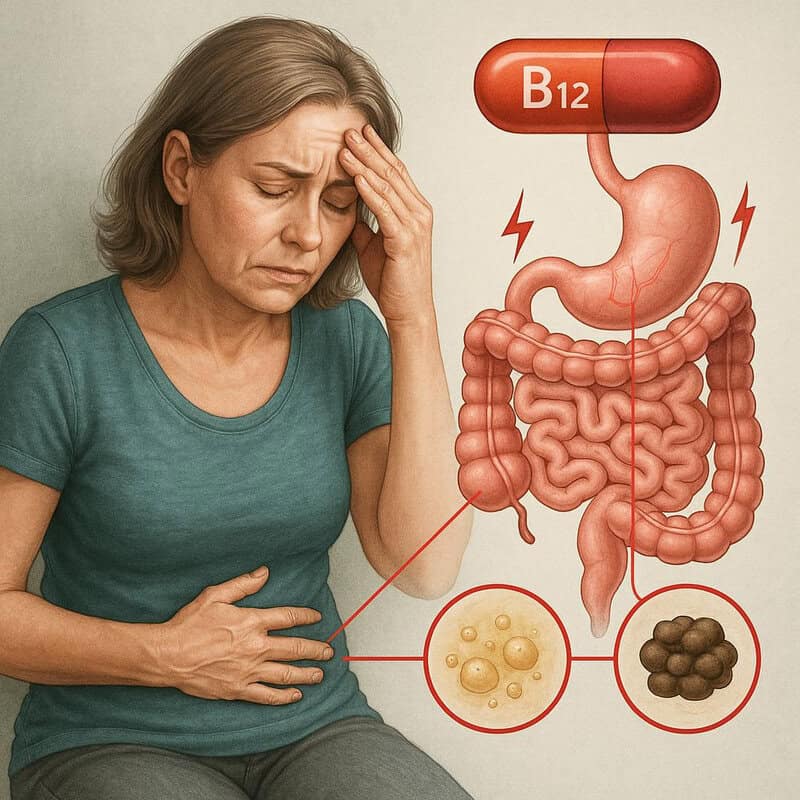
Vitamin B12 deficiency can disrupt the normal function of the digestive system, leading to changes in gastrointestinal motility such as diarrhea or constipation. B12 is essential for maintaining healthy nerves, including those that regulate the movement of the digestive tract. When levels are low, the signals that control muscle contractions in the gut can become impaired, resulting in irregular bowel movements (source).
These symptoms are often mistaken for irritable bowel syndrome (IBS), a common condition characterized by alternating diarrhea and constipation, abdominal cramping, and bloating. However, unlike IBS, digestive issues related to B12 deficiency frequently occur alongside other systemic symptoms such as fatigue, numbness, or unexplained weight loss. The onset of new or persistent bowel changes in someone with dietary restrictions, a history of gastrointestinal surgery, or other risk factors should prompt consideration of B12 status.
If you experience chronic diarrhea, constipation, or unexplained changes in bowel habits—especially in combination with other signs of B12 deficiency—it is important to discuss these symptoms with your healthcare provider. Blood testing for vitamin B12 can help clarify the connection and guide treatment to restore both digestive and overall health.
18. Swollen, Smooth Tongue

Atrophic glossitis, a hallmark of vitamin B12 deficiency, presents as a swollen, smooth, and often painful tongue. This condition results from the loss of papillae—tiny projections that give the tongue its normal rough texture—leaving it looking glossy and red. Atrophic glossitis can cause considerable discomfort, making it difficult to eat, speak, or swallow (source).
This symptom differs from other tongue changes such as geographic tongue, which is characterized by irregular, map-like patches, or from oral thrush, which involves white, creamy lesions. Unlike these conditions, atrophic glossitis is more diffuse, affecting the entire tongue and leading to a generalized smooth appearance. The swelling may also be accompanied by burning, tenderness, or cracks at the corners of the mouth.
Monitoring oral symptoms is important for early detection of B12 deficiency. Routinely check for changes in tongue color, texture, and sensitivity. If you observe a persistent smoothness, swelling, or soreness—especially in combination with other subtle signs like fatigue or numbness—it is advisable to consult a healthcare provider. Early diagnosis and treatment can reverse oral changes and prevent further complications.
19. Frequent Headaches

Frequent or recurrent headaches can be an overlooked sign of vitamin B12 deficiency, often tied to the development of anemia. When B12 levels are low, the body produces fewer healthy red blood cells, resulting in decreased oxygen delivery—a condition known as cerebral hypoxia—especially to the brain (source). This lack of adequate oxygen can trigger headaches, which may range from mild and nagging to more intense and debilitating episodes.
For example, a person who has never struggled with headaches might suddenly begin to experience them several times a week, either as a dull ache or throbbing pain. These headaches may worsen with exertion, stress, or lack of sleep and might not respond to typical over-the-counter remedies. Because headaches are such a common complaint and have many possible causes—including dehydration, eye strain, or sinus issues—they are rarely immediately linked to a vitamin deficiency.
If you notice a new pattern of frequent headaches—especially when accompanied by other symptoms such as fatigue, pale skin, or dizziness—it’s important to mention this to your healthcare provider. A blood test for vitamin B12 and other markers of anemia can help uncover the root cause and guide effective treatment.
20. Sore Muscles

Sore muscles are a lesser-known but important symptom of vitamin B12 deficiency. The underlying cause is muscle fatigue resulting from reduced oxygen delivery to muscle tissues, a consequence of anemia that develops when B12 is lacking. Without sufficient healthy red blood cells, muscles do not receive the oxygen they need to function properly and recover after everyday activities (source).
Unlike soreness from overuse injuries or exercise—which tends to be localized and related to specific activities—muscle pain due to B12 deficiency is more generalized, persistent, and often affects multiple muscle groups. For instance, a person may feel aching in their legs, arms, or back even after minimal exertion, or they may wake up with muscle pain despite a restful night’s sleep. The discomfort can range from mild stiffness to more pronounced soreness that limits daily activities.
If you experience persistent muscle soreness that cannot be explained by physical activity, injury, or another medical condition—especially when combined with other symptoms such as weakness, fatigue, or numbness—it may be a sign of an underlying B12 deficiency. Consulting your healthcare provider and requesting blood tests can help identify the cause and guide appropriate treatment.
21. Irregular Heartbeat
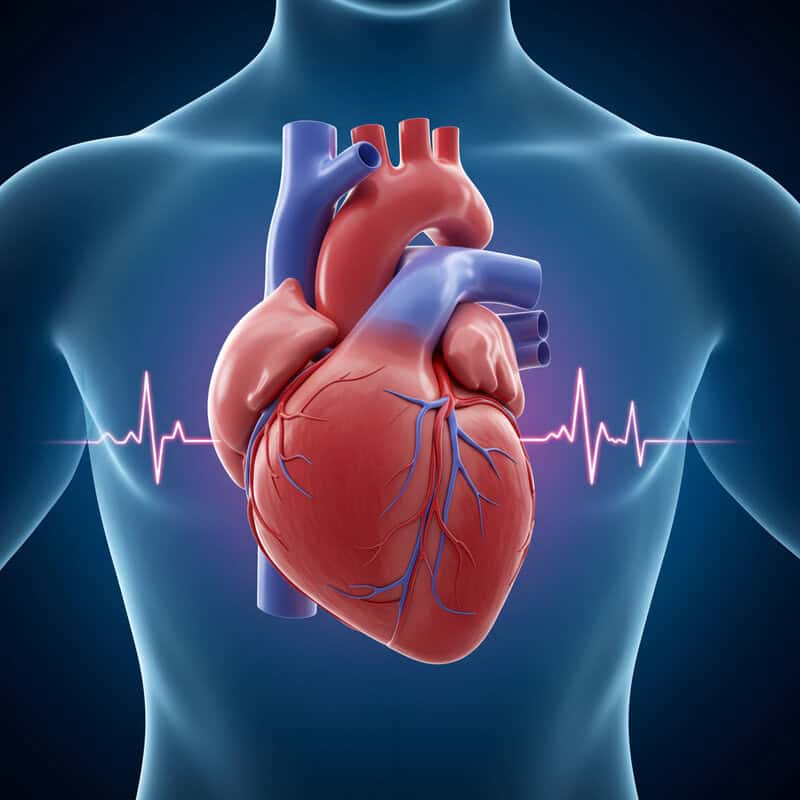
An irregular heartbeat, or arrhythmia, can occur as a consequence of vitamin B12 deficiency-related anemia. When the body lacks sufficient healthy red blood cells, the heart must work harder to circulate oxygen, sometimes resulting in abnormal heart rhythms. These arrhythmias may be experienced as skipped beats, fluttering, or a persistently irregular pulse (source).
Unlike atrial fibrillation, a specific and often more severe type of arrhythmia usually diagnosed by an electrocardiogram (ECG) and associated with underlying heart disease, B12 deficiency-related arrhythmia is usually secondary to anemia and may resolve with correction of the deficiency. However, the sensation of an irregular or racing heartbeat can be alarming and is sometimes mistaken for anxiety, panic attacks, or primary cardiac issues.
Warning signs to watch for include a noticeable irregular pulse, palpitations that occur at rest or during light activity, chest discomfort, or unexplained fatigue. If you experience a new or persistent irregular heartbeat—especially with symptoms such as dizziness, shortness of breath, or weakness—it is essential to seek prompt medical evaluation. Blood tests can help distinguish between anemia-related arrhythmias and more serious heart conditions, ensuring appropriate treatment.
22. Depression
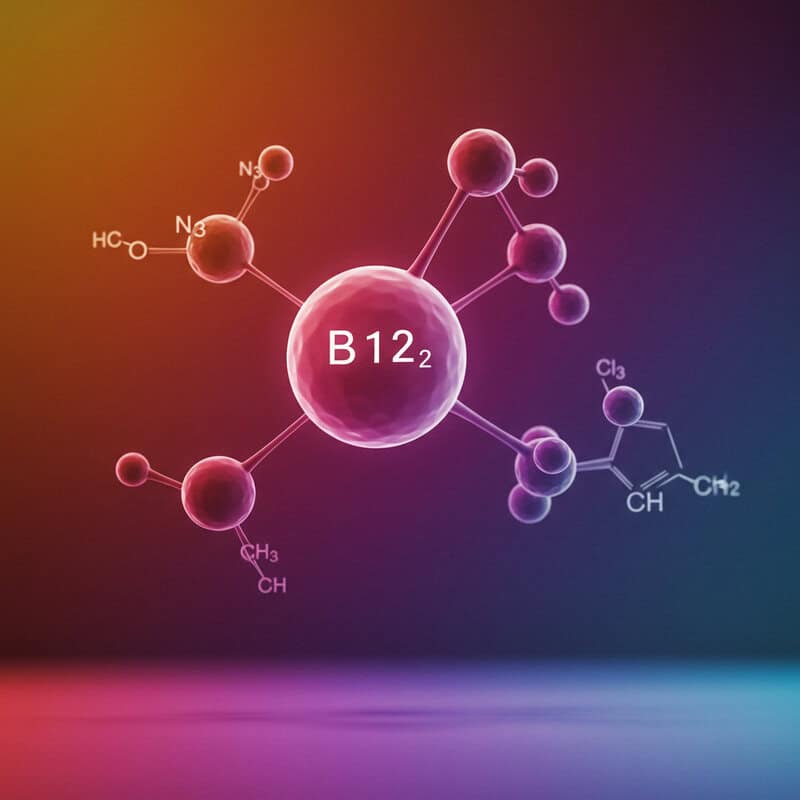
Vitamin B12 plays a crucial role in the synthesis of neurotransmitters such as serotonin and dopamine, which are directly involved in regulating mood and emotional stability. When B12 levels are insufficient, the resulting imbalance in these brain chemicals can lead to symptoms of depression, including persistent sadness, loss of interest in activities, and feelings of hopelessness. These biochemical changes highlight the importance of adequate B12 for optimal mental health (source).
There are many cases where individuals suffering from undiagnosed B12 deficiency are initially treated for depression with therapy or antidepressants, but see little or no improvement. For example, a middle-aged adult experiencing fatigue, sadness, and low motivation might be diagnosed with depressive disorder. Despite adherence to prescribed treatments, their symptoms persist until laboratory testing reveals a significant B12 deficiency. With supplementation, their mood and energy levels gradually improve, demonstrating the link between nutrient status and mental well-being.
If you or someone you know is experiencing new or worsening depressive symptoms—especially alongside physical issues like fatigue, numbness, or memory lapses—it’s important to consider B12 deficiency as a possible underlying factor. Discussing a simple blood test with your healthcare provider can help determine the right course of action.
23. Anxiety

Vitamin B12 is essential for the synthesis of neurotransmitters such as serotonin, dopamine, and gamma-aminobutyric acid (GABA), all of which play key roles in regulating mood and calming the nervous system. When B12 levels are low, neurotransmitter production may be disrupted, potentially resulting in heightened anxiety, restlessness, and difficulty coping with everyday stress (source).
Consider the example of an individual with no prior history of anxiety who begins to experience persistent nervousness, racing thoughts, and physical symptoms such as heart palpitations and sweating. Despite lifestyle changes, mindfulness practices, and even anti-anxiety medications, their symptoms persist and begin to interfere with work and social life. After further evaluation, a blood test reveals a significant vitamin B12 deficiency. With appropriate supplementation, their anxiety gradually subsides, highlighting the link between nutrient status and emotional well-being.
If you notice the onset of anxiety symptoms—especially if they are new, unexplained, or resistant to typical interventions—it is important to consider a broader medical evaluation. Discuss your symptoms with your healthcare provider and request bloodwork to assess B12 and other nutrient levels. Correcting an underlying deficiency can often bring significant relief and restore emotional balance.
24. Difficulty Swallowing
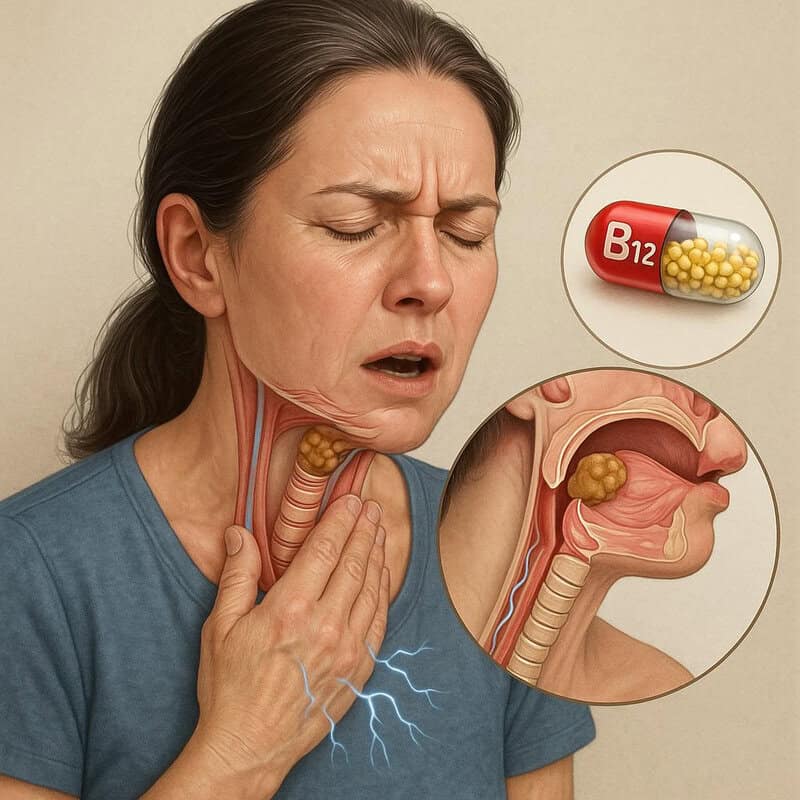
Difficulty swallowing, or dysphagia, can develop as a result of neurological impairment caused by vitamin B12 deficiency. This vitamin is vital for maintaining the health and function of nerves, including those responsible for coordinating the complex muscle movements involved in swallowing. When these nerves are damaged, individuals may experience a sensation of food sticking in the throat, coughing or choking during meals, or even pain when swallowing (source).
While dysphagia is often associated with neurological conditions such as stroke—where sudden, severe nerve damage leads to abrupt swallowing difficulties—B12 deficiency typically causes a more gradual onset. The symptoms may be subtle at first, such as needing extra time to chew or repeatedly clearing the throat, and can progress over time if the deficiency is not addressed. Unlike stroke-related dysphagia, which is frequently accompanied by facial weakness or speech problems, B12-related swallowing issues are usually accompanied by other signs of nerve dysfunction, such as tingling or numbness in the extremities.
If you develop unexplained difficulty swallowing, particularly in conjunction with other neurological symptoms or risk factors for B12 deficiency, it is important to seek medical evaluation. Early diagnosis and treatment can prevent worsening symptoms and improve quality of life.
25. Darkening of Skin

Vitamin B12 deficiency can sometimes lead to unusual skin changes, including hyperpigmentation—a darkening of the skin caused by increased melanin production. This occurs because B12 plays a role in DNA synthesis and cell repair, and when levels are low, abnormal melanin distribution may develop, particularly in areas exposed to friction such as the knuckles, palms, or the creases of the hands and feet (source).
A practical example is a person who notices that the skin on their knuckles or the backs of their hands is becoming darker and more pronounced compared to the rest of their body. This hyperpigmentation can sometimes be mistaken for sun damage, eczema, or a reaction to certain medications. Unlike common causes of skin darkening, B12 deficiency-related pigmentation changes tend to be more diffuse and may also appear on the soles of the feet or inside the mouth.
If you observe new or unexplained dark patches on your skin—especially when accompanied by other signs of B12 deficiency such as fatigue, numbness, or oral changes—it’s important to mention these findings to your healthcare provider. Simple blood tests can help determine if a vitamin deficiency is contributing to the skin changes and guide appropriate treatment.
26. Brittle Nails

Vitamin B12 is essential for healthy cell division and the formation of red blood cells, both of which support the growth and maintenance of strong nails. When B12 levels are deficient, reduced oxygen delivery and impaired cell turnover can result in brittle, weak, or ridged nails. Nails may split, break easily, or develop a spoon-like shape called koilonychia (source).
Brittle nails are also commonly seen in iron deficiency anemia, another condition that leads to poor oxygenation of tissues. While both deficiencies can cause similar nail changes, B12 deficiency is more likely to be associated with other neurological or oral symptoms, such as numbness, glossitis, or mouth ulcers. In contrast, iron deficiency may cause additional symptoms like hair loss or cravings for non-food substances (pica).
To assess the health of your nails, look for changes such as increased fragility, marked ridges running lengthwise, discoloration, or flattening of the nail surface. Persistent nail changes that do not improve with moisturizing or dietary adjustments may signal an underlying nutritional issue. If brittle nails are accompanied by other signs of ill health, consult your healthcare provider for a comprehensive evaluation and appropriate blood tests.
27. Hair Loss
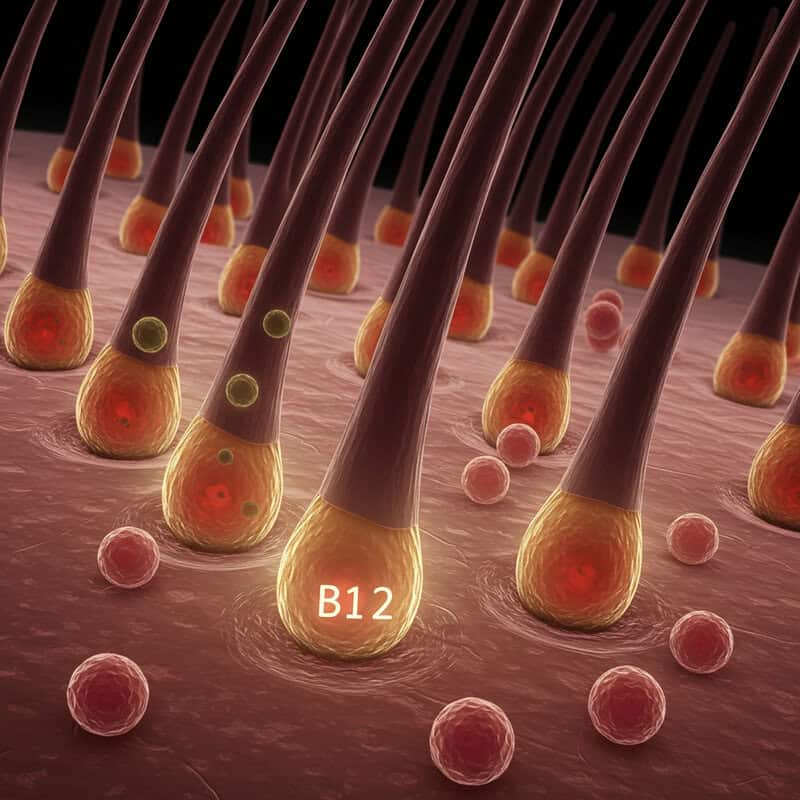
Vitamin B12 plays a pivotal role in cell division and the delivery of oxygen to rapidly growing tissues, including hair follicles. When B12 levels are low, hair follicles may not receive the nutrients and oxygen they need to support healthy growth, leading to increased hair shedding or thinning. This form of diffuse hair loss is known as telogen effluvium and is often reversible once the underlying deficiency is corrected (source).
Hair loss from B12 deficiency shares similarities with hair changes seen in other nutritional deficiencies, such as iron, zinc, or protein. For example, iron deficiency anemia is a well-known cause of hair thinning, as are deficiencies in essential fatty acids and biotin. However, B12 deficiency is often accompanied by additional signs such as numbness, fatigue, or oral changes, which can help distinguish it from other causes.
If you notice a sudden increase in hair shedding, receding hairline, or noticeable thinning—particularly when accompanied by other symptoms of B12 deficiency—it’s important to discuss these changes with your healthcare provider. A blood test can help identify or rule out nutritional causes, and appropriate supplementation can often restore hair health and growth.
28. Low Blood Pressure
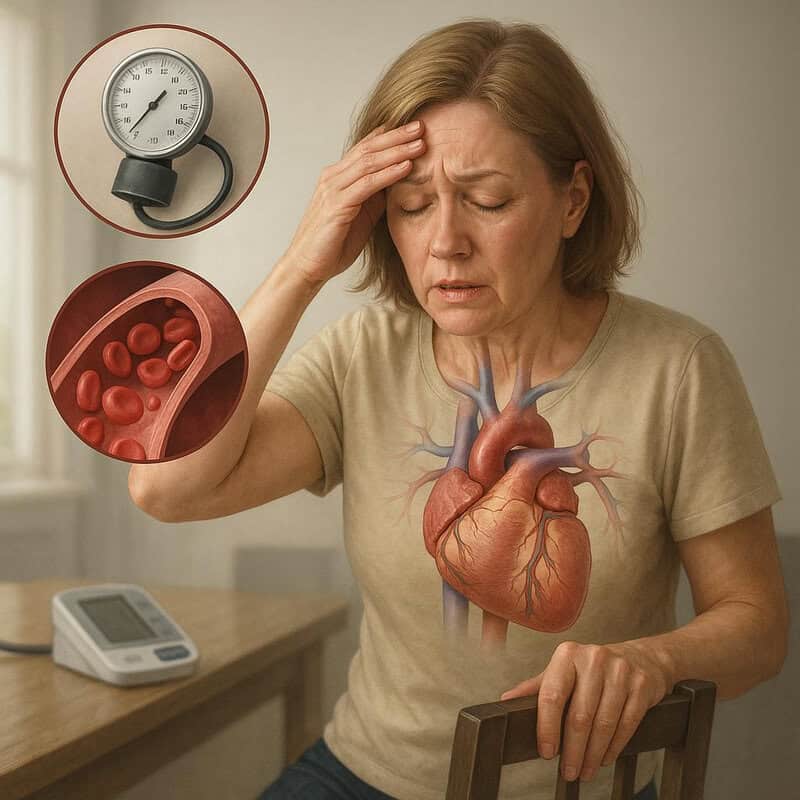
Vitamin B12 deficiency can lead to anemia, which in turn may result in lowered blood pressure (hypotension). When there are not enough healthy red blood cells to carry oxygen efficiently, the heart and blood vessels must compensate to maintain adequate circulation. This often causes blood pressure to drop, particularly when standing up, leading to symptoms such as lightheadedness, dizziness, fainting, or feeling unusually weak (source).
Low blood pressure from B12-related anemia differs from hypotension caused by dehydration or heart conditions, as it is typically accompanied by other signs of anemia such as fatigue, pale skin, and shortness of breath. The symptoms may become most noticeable when moving from sitting to standing, a phenomenon known as orthostatic hypotension. Monitoring these episodes can help distinguish between causes.
If you experience frequent episodes of dizziness, fainting, or weakness, especially upon standing, it is important to track your blood pressure readings and note any associated symptoms. If these signs are persistent or are accompanied by other features of vitamin B12 deficiency, consult your healthcare provider. Prompt diagnosis and treatment of the underlying anemia can help restore normal blood pressure and improve overall well-being.
29. Increased Infections

Vitamin B12 is vital for the production and maturation of white blood cells, the body’s frontline defense against infections. When B12 levels are low, immune function can become compromised, making you more susceptible to frequent or persistent infections such as colds, respiratory tract infections, urinary tract infections, or even slow-healing wounds (source).
This immune impairment is somewhat similar to what is seen in vitamin D deficiency, where inadequate nutrient levels are linked to reduced immune response and increased risk of illness. However, while vitamin D is most closely associated with respiratory and bone health, B12 plays a broader role in DNA synthesis and the formation of all blood cells, including those critical for immune surveillance and response. This means that infections in B12 deficiency can be diverse and sometimes severe if not corrected.
If you notice that you are getting sick more frequently, your infections are lasting longer than usual, or you have difficulty recovering from minor illnesses, it is important to consider an underlying nutritional deficiency. Especially if these issues occur alongside other subtle symptoms of B12 deficiency, consult your healthcare provider and request a blood test to evaluate your B12 and immune status.
30. Difficulty Walking Up Stairs

Vitamin B12 is essential for proper energy metabolism and the production of healthy red blood cells, both of which enable muscles to perform efficiently during physical activities. When B12 is deficient, reduced oxygen delivery and impaired cellular energy production can make climbing stairs or other forms of exertion unusually challenging. This often presents as disproportionate fatigue, shortness of breath, or muscle weakness during activities that previously felt effortless (source).
For instance, an otherwise healthy adult may suddenly find themselves needing to pause halfway up a flight of stairs, their legs feeling heavy and breath becoming labored. This decline in stamina is not always attributed to aging or lack of fitness, especially when it develops rapidly or without a clear cause. Unlike the soreness or fatigue after intense exercise, B12 deficiency-related activity intolerance persists and may worsen over time.
Watch for cues such as frequent stops during stair climbing, unexplained exhaustion after mild activity, or a noticeable decline in your ability to keep up with peers. If these symptoms are present—especially alongside other hidden signs of vitamin B12 deficiency—speak with your healthcare provider about evaluating your B12 status to address the root cause and restore your energy.
31. Burning Sensation in Feet
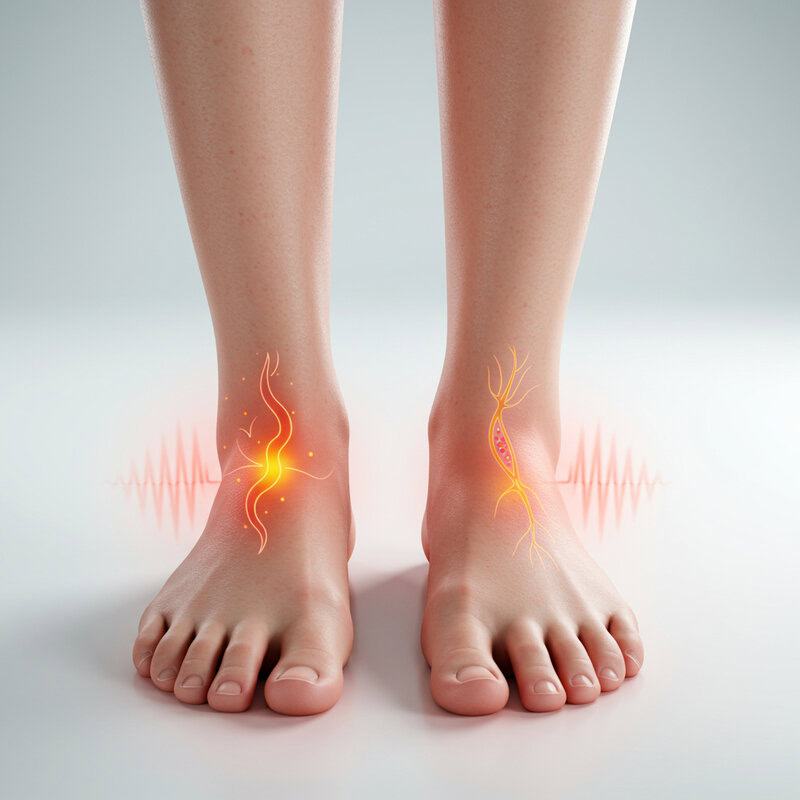
A burning sensation in the feet is a potential neurological symptom of vitamin B12 deficiency, caused by damage to the sensory nerves that transmit signals from the extremities to the brain. B12 is vital for maintaining the myelin sheath that protects nerves; without adequate levels, nerves become damaged and misfire, resulting in sensations such as burning, tingling, or numbness (source).
This symptom closely resembles diabetic neuropathy, a common complication of diabetes where chronically high blood sugar injures peripheral nerves. Both conditions can cause burning pain, especially at night, and may be accompanied by reduced sensation or balance issues. However, B12 deficiency-related neuropathy may occur even in individuals without diabetes and can progress more rapidly if not addressed, making early recognition essential.
Early warnings include an unexplained burning or prickling sensation in the soles of the feet, which worsens after periods of standing or at bedtime. Over time, this can spread to the legs or hands. If you notice these symptoms—particularly in the absence of diabetes or other risk factors—consider discussing vitamin B12 testing with your healthcare provider. Prompt treatment can often reverse nerve symptoms and prevent long-term complications.
32. Restless Legs Syndrome

Restless Legs Syndrome (RLS) is a neurological condition characterized by an uncontrollable urge to move the legs, often accompanied by uncomfortable sensations such as tingling, crawling, or itching. While the exact cause of RLS is not fully understood, research suggests a possible association with vitamin B12 deficiency, as B12 is crucial for nerve health and neurotransmitter synthesis (source).
A real-world example involves an individual who begins to experience odd sensations in the legs, particularly in the evening or at night, making it difficult to relax or fall asleep. The urge to move the legs provides temporary relief, but the symptoms return whenever they try to rest. This sleep disruption can lead to daytime fatigue, irritability, and decreased quality of life. Although iron deficiency is a well-known trigger for RLS, vitamin B12 deficiency has also been reported in some cases, especially when other signs of neuropathy or anemia are present.
If you notice persistent restlessness or discomfort in your legs—especially when sitting or lying down—along with other subtle symptoms of B12 deficiency, it is important to discuss these concerns with your healthcare provider. Blood tests can determine if a nutritional deficiency is contributing to your symptoms, allowing for targeted treatment and potential symptom relief.
33. Impaired Sense of Taste or Smell

Vitamin B12 deficiency can be responsible for subtle but troubling changes in the senses of taste (dysgeusia) and smell (hyposmia or anosmia). These changes arise from neurological impairment, as B12 is critical for maintaining the health and function of sensory nerves in the mouth and nasal passages. When B12 is lacking, these nerves can become damaged, leading to a diminished or altered perception of flavors and scents (source).
Impaired taste and smell are also common after viral infections, such as influenza or COVID-19, due to inflammation or direct viral injury to sensory nerves. However, post-viral changes typically have a clear onset following illness and often improve as the body recovers. In contrast, B12 deficiency-related sensory changes tend to develop more gradually and are often accompanied by other neurological symptoms, including numbness, tingling, or glossitis.
If you notice that foods seem bland, flavors are difficult to distinguish, or familiar scents are faint or absent—especially if this accompanies other symptoms of B12 deficiency—it’s wise to seek medical advice. Early recognition and treatment of B12 deficiency can help restore sensory function and protect overall neurological health.
34. Reduced Reflexes
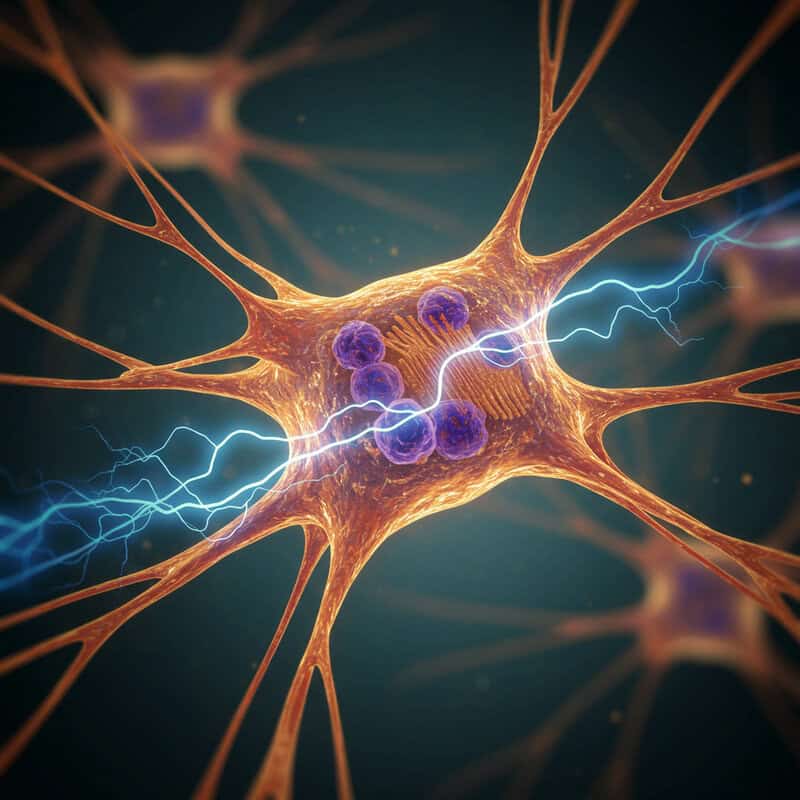
Vitamin B12 deficiency can lead to reduced or slowed reflexes, a subtle neurological sign that often goes unnoticed until it begins to affect daily function. B12 is essential for the maintenance of myelin, the protective sheath around nerves. When B12 is lacking, nerves lose this insulation, resulting in slower transmission of electrical signals. This demyelination can cause delays in reflex responses, especially in the lower limbs (source).
A clinical example involves an individual who, during a routine neurological exam, demonstrates a diminished knee-jerk (patellar) reflex. This finding may be accompanied by other symptoms of neuropathy, such as numbness, tingling, or weakness in the legs. In some cases, reduced reflexes may manifest as delayed reactions when catching yourself from a fall, or slower withdrawal from a painful stimulus.
To self-check for reduced reflexes, pay attention to changes in your response to sudden movements or minor injuries. For instance, if you notice it takes longer to react when stepping on something sharp or when maintaining balance, it could be an early warning sign. If these changes occur alongside other symptoms of B12 deficiency, discuss them with your healthcare provider for further evaluation and testing.
35. Menstrual Irregularities
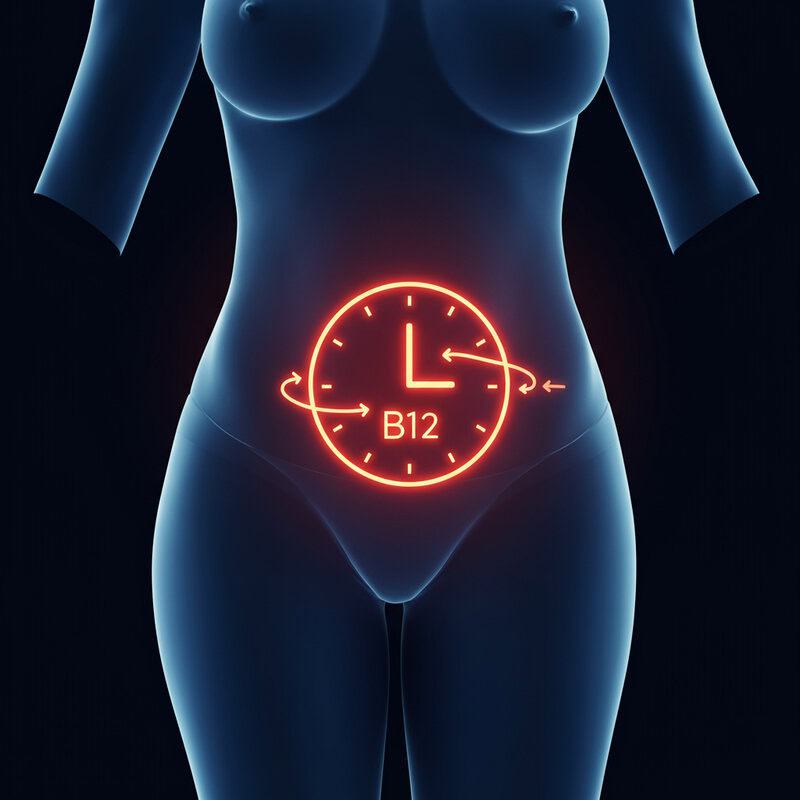
Vitamin B12 plays an important role in reproductive health, including the regulation of menstrual cycles. When B12 levels are low, the resulting anemia and impaired cellular function can disrupt the delicate hormonal balance required for regular menstruation. This may lead to symptoms such as missed periods (amenorrhea), unusually heavy or prolonged bleeding (menorrhagia), or unpredictable cycle lengths (source).
Consider the case of a woman who previously had regular cycles but begins experiencing skipped periods or excessive bleeding without any obvious change in lifestyle or stress level. She may also notice accompanying symptoms like fatigue, pallor, and lightheadedness. While menstrual irregularities can result from many factors—such as stress, thyroid disorders, or polycystic ovary syndrome (PCOS)—persistent changes, especially when associated with signs of anemia or neuropathy, should prompt further investigation for vitamin B12 deficiency.
If you notice abnormal menstrual patterns, track your symptoms and cycle dates for several months. Bring this information to your healthcare provider, especially if you have risk factors for B12 deficiency such as a vegetarian diet, digestive disorders, or a history of anemia. Blood testing can help identify or rule out B12 deficiency as a contributing factor and guide appropriate treatment.
36. Infertility

Vitamin B12 plays a crucial role in fertility for both men and women, as it is essential for DNA synthesis, cell division, and the proper functioning of reproductive organs. In women, B12 deficiency can lead to ovulatory problems and disruptions in the menstrual cycle, making it more difficult to conceive. In men, low B12 levels have been linked to reduced sperm count, impaired motility, and abnormal sperm morphology (source).
Folate deficiency is another well-established cause of infertility, as both B12 and folate are necessary for the methylation processes involved in embryo development. A deficiency in either vitamin can lead to similar reproductive challenges, including difficulty conceiving and increased risk of early miscarriage. In some cases, treating a B12 deficiency can improve fertility outcomes, particularly when other causes have been ruled out.
For individuals or couples trying to conceive, it’s important to consider vitamin B12 status as part of a comprehensive preconception health check—especially if there are unexplained delays or a history of irregular cycles. Discuss any fertility concerns with your healthcare provider and request blood tests to evaluate B12 and folate levels. Early identification and correction can improve fertility and support a healthy pregnancy.
37. Hearing Loss
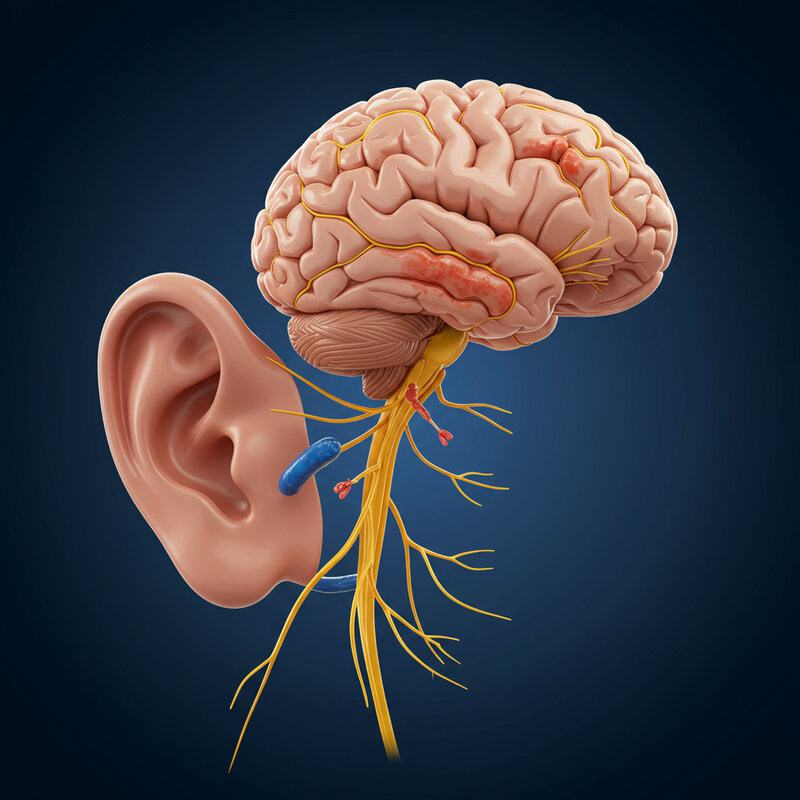
Hearing loss is a rare but documented complication of vitamin B12 deficiency, usually resulting from nerve damage affecting the auditory pathway. B12 is essential for the maintenance of the myelin sheath that insulates nerves, including those involved in hearing. When deficiency occurs, demyelination and subsequent nerve dysfunction can impair the transmission of sound signals from the inner ear to the brain, leading to sensorineural hearing loss (source).
This type of hearing loss differs from the more common age-related hearing loss (presbycusis), which is typically gradual and related to the cumulative effects of aging on the ear’s structures. In contrast, B12 deficiency-related hearing loss may develop more rapidly and can sometimes be associated with other neurological symptoms, such as numbness, tingling, or difficulty with balance. The hearing loss may also be reversible if detected and treated early.
If you notice new or sudden difficulty hearing—especially if accompanied by other signs of nerve dysfunction—do not dismiss it as just a part of aging. Seek prompt evaluation from an ear, nose, and throat (ENT) specialist or your healthcare provider. Blood tests for B12 and a hearing assessment can help determine the cause and facilitate timely intervention.
38. Increased Bruising

Increased bruising can be a subtle but important sign of vitamin B12 deficiency. B12 is necessary for the healthy production and maturation of all blood cells, including platelets, which are responsible for blood clotting. When B12 levels are low, platelet counts may drop (thrombocytopenia), making it easier for small blood vessels to break and for bruises to form even after minor bumps or pressure (source).
This tendency to bruise easily is sometimes mistaken for vitamin K deficiency, another condition that impairs blood clotting but through a different mechanism—vitamin K is required for the synthesis of clotting factors in the liver. While both deficiencies can lead to increased bruising and bleeding, vitamin B12 deficiency is usually accompanied by additional symptoms such as fatigue, pale or jaundiced skin, and neurological changes. In contrast, vitamin K deficiency more often presents with nosebleeds, bleeding gums, or blood in the stool.
If you notice frequent or unexplained bruises, especially in conjunction with other symptoms of B12 deficiency, it is important to seek a medical evaluation. Your healthcare provider can order blood tests to check platelet counts and vitamin levels, ensuring that any underlying issue is identified and treated appropriately.
39. Slow Wound Healing
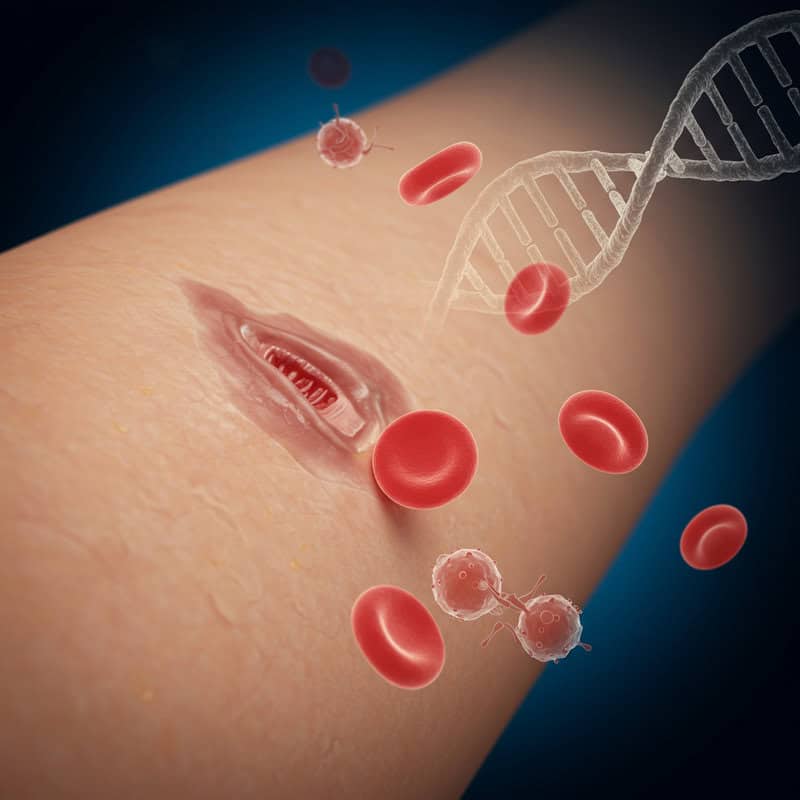
Vitamin B12 deficiency can significantly slow the body’s ability to repair tissue, leading to delayed wound healing. B12 is essential for DNA synthesis, cell division, and the production of new red blood cells, all of which are critical for generating the tissue and immune response necessary to close and heal wounds. When B12 is lacking, injuries—whether minor cuts, scrapes, or surgical incisions—may take noticeably longer to heal (source).
For example, a person might notice that a small cut on their hand remains red, swollen, or unhealed for weeks, whereas similar wounds used to resolve quickly. This delay can increase the risk of infection and scarring, and may be accompanied by other subtle signs of B12 deficiency such as fatigue, pallor, or increased susceptibility to bruising and infection.
If you observe that wounds are taking longer than usual to heal—especially in the absence of diabetes or other chronic conditions known to impair healing—it is a good idea to discuss these concerns with your healthcare provider. Nutritional testing, including an assessment of B12 levels, can help identify underlying deficiencies and guide targeted treatment to restore your body’s natural healing capacity.
40. Yellowing of the Whites of the Eyes

Yellowing of the whites of the eyes, known as scleral icterus, can occur as a subtle sign of vitamin B12 deficiency anemia. When B12 levels are low, the production of healthy red blood cells decreases, and those that are produced may be abnormally large and fragile. These cells break down more easily, releasing bilirubin—a yellow pigment—into the bloodstream. Mild increases in bilirubin can cause a faint yellow tint in the eyes (source).
This form of mild jaundice is distinct from the more pronounced yellowing seen in liver disease, where liver dysfunction leads to much higher levels of bilirubin and often causes yellowing of both the skin and eyes. While liver-related jaundice is usually accompanied by symptoms such as dark urine, abdominal pain, or itching, B12 deficiency-related scleral icterus tends to develop gradually and is often associated with other signs of anemia, such as fatigue, pallor, or shortness of breath.
Check for a subtle yellowish hue in the whites of your eyes, especially in natural light. If this visual cue appears alongside other warning signs of B12 deficiency, consult your healthcare provider for blood testing and evaluation to ensure timely diagnosis and treatment.
41. Low Body Temperature

Vitamin B12 deficiency can lead to a noticeable drop in body temperature due to its impact on metabolism and red blood cell production. B12 is essential for energy metabolism at the cellular level, and when levels are low, metabolic processes slow down, reducing the body’s ability to generate heat. Anemia from B12 deficiency further limits oxygen delivery to tissues, compounding the tendency toward feeling cold or experiencing a lower-than-normal body temperature (source).
Imagine a scenario where someone finds themselves especially sensitive to cold weather, shivering more than usual, or unable to warm up even indoors during winter. They may notice their hands and feet are consistently chilly or that their measured body temperature is slightly below the normal range. Unlike occasional coldness from short-term exposure, this symptom persists and cannot be easily explained by the environment alone.
If you experience persistent cold intolerance or measure a consistently lower body temperature—particularly when accompanied by other subtle signs of B12 deficiency like fatigue, pallor, or numbness—it’s important to track these changes and inform your healthcare provider. Blood tests can help determine if a nutritional deficiency or another underlying health issue is responsible for your symptoms.
42. Muscle Cramps

Muscle cramps, often described as sudden, painful contractions, can be a lesser-known symptom of vitamin B12 deficiency. B12 is vital for nerve function and the maintenance of healthy myelin sheaths, which facilitate proper communication between nerves and muscles. When B12 is lacking, nerve signals may become erratic, disrupting muscle contraction and relaxation cycles. In addition, B12 deficiency can indirectly affect electrolyte balance due to impaired red blood cell production and reduced oxygenation of tissues, both of which contribute to muscle health (source).
Muscle cramps are commonly associated with dehydration or the loss of electrolytes like potassium and magnesium, especially after intense exercise or sweating. Unlike these types of cramps, which typically resolve with hydration or dietary adjustments, B12-related cramps may persist or recur even when fluid and electrolyte intake is adequate. They are likely to occur in the legs, feet, or hands, sometimes waking individuals from sleep or interfering with daily activities.
If you experience frequent or unexplained muscle cramps—especially when accompanied by other neurological symptoms such as numbness, tingling, or weakness—consider asking your healthcare provider about B12 testing. Early identification and treatment of a deficiency can help resolve cramps and restore normal muscle and nerve function.
43. Frequent Night Sweats
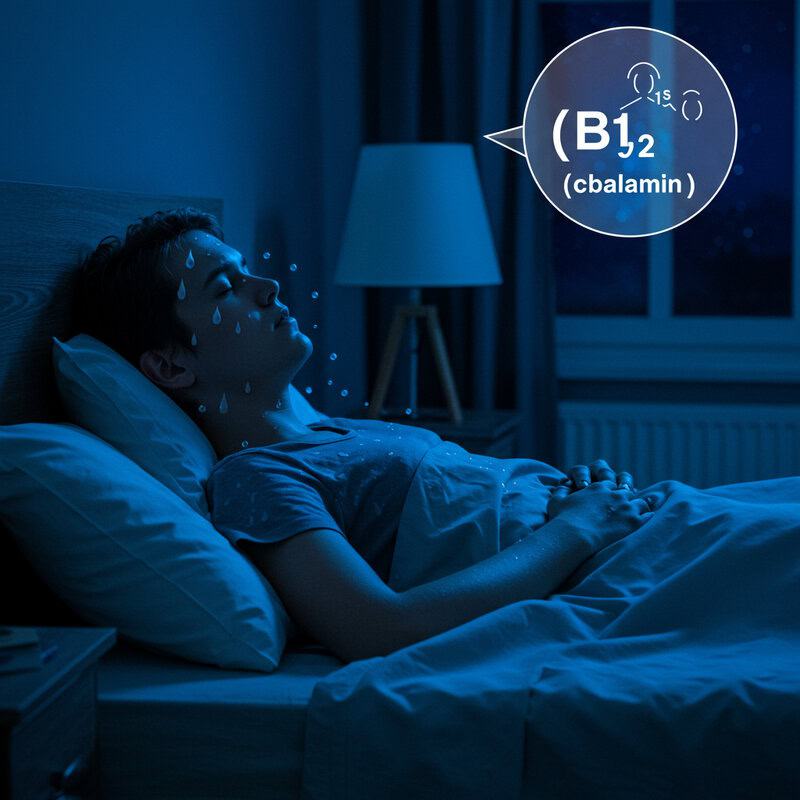
Frequent night sweats can be an overlooked symptom of vitamin B12 deficiency, stemming from its effects on the autonomic nervous system—the part of the nervous system that controls involuntary bodily functions such as sweating, heart rate, and temperature regulation. B12 is essential for maintaining nerve health, and deficiency can disrupt autonomic function, leading to abnormal sweating patterns, particularly at night (source).
For example, a person might wake up multiple times during the night drenched in sweat, despite sleeping in a cool room and using light bedding. This pattern may persist for weeks or months, and is often mistaken for hormonal imbalances, anxiety, or even early signs of infection. Unlike night sweats caused by menopause or fever, those linked to B12 deficiency are typically accompanied by other neurological or hematological symptoms, such as tingling, fatigue, or paleness.
If you experience persistent or unexplained night sweats—especially in combination with symptoms like numbness, weakness, or changes in mood—it’s worth raising the issue with your healthcare provider. They may recommend blood tests, including B12 levels, to investigate the root cause and help guide appropriate treatment for symptom resolution.
44. Easy Fracturing of Bones
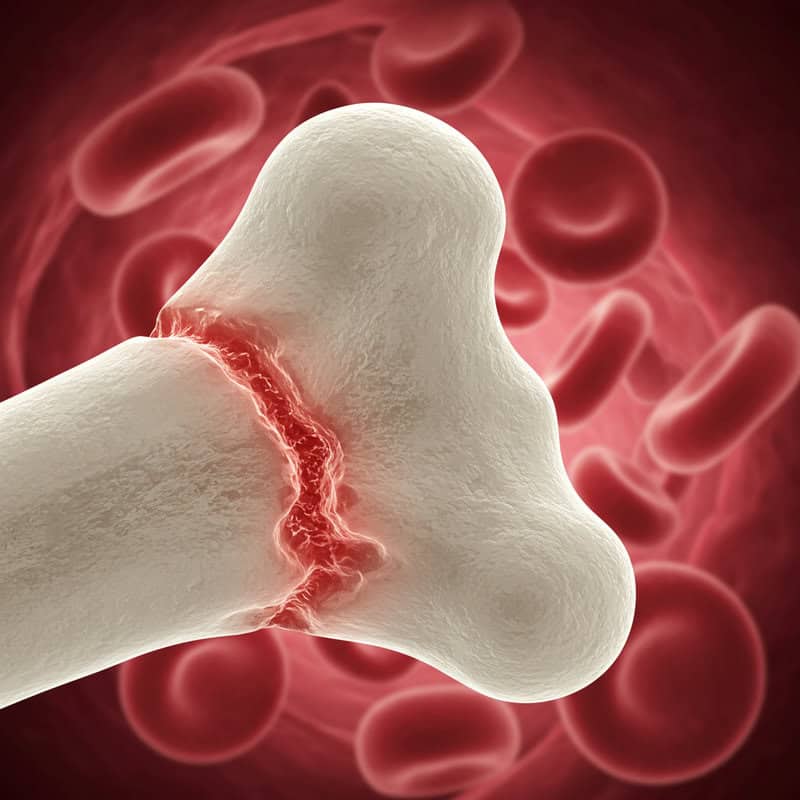
Vitamin B12 is crucial not only for red blood cell production but also for maintaining healthy bone marrow, where blood cells are produced and bone strength is supported. A deficiency in B12 can lead to decreased bone mineral density and impaired bone formation, thereby increasing the risk of fractures even from minor falls or injuries. This is especially concerning in older adults, who are already at elevated risk for bone health issues (source).
Unlike osteoporosis, which primarily results from a long-term loss of bone mass due to hormonal changes, aging, or calcium/vitamin D deficiency, B12 deficiency affects the bone indirectly by disturbing bone marrow health and slowing down the renewal of bone tissue. Osteoporosis typically develops gradually over many years, whereas the bone changes associated with B12 deficiency may progress more rapidly and be accompanied by additional symptoms like anemia, neuropathy, or fatigue.
If you experience easy fracturing of bones or notice a decrease in bone strength—particularly alongside other symptoms of B12 deficiency—it is important to discuss these issues with your healthcare provider. Bone density assessments and blood tests, including B12 levels, can help determine the underlying cause and guide effective treatment to protect bone health.
45. Swollen Ankles

Swollen ankles, or peripheral edema, can be a subtle sign of vitamin B12 deficiency, particularly when deficiency-related anemia places extra strain on the heart or causes disruptions in protein production. When B12 levels are low, anemia can force the heart to work harder to circulate blood, potentially leading to mild heart failure symptoms and fluid accumulation in the lower extremities. Additionally, B12 plays a role in the synthesis of proteins required to maintain proper fluid balance in the body (source).
Unlike swelling caused by injury, venous insufficiency, or kidney problems, B12 deficiency-related swelling tends to be more subtle and often occurs alongside other signs of anemia, such as fatigue, weakness, or shortness of breath. The swelling is usually symmetrical and may worsen after prolonged periods of standing or sitting.
To monitor for this sign, check your ankles and lower legs daily for puffiness, tightness, or indentations left after pressing with a finger (pitting edema). If swelling persists or is accompanied by other symptoms of vitamin B12 deficiency, inform your healthcare provider. Blood tests and a thorough evaluation can help uncover the underlying cause and ensure timely intervention to prevent further complications.
46. Dark Urine

Dark urine can be a subtle but important clue in the context of vitamin B12 deficiency. When B12 is low, red blood cells are produced in abnormal shapes and sizes and tend to break down prematurely. This process releases bilirubin—a yellow pigment—into the bloodstream. When bilirubin levels rise, the excess is filtered through the kidneys and excreted in the urine, leading to a darker, amber color (source).
It’s important to distinguish dark urine from changes caused by dehydration, which typically results in concentrated, yellow-to-amber urine that lightens with increased fluid intake. In contrast, bilirubin-induced dark urine may persist even when you are well-hydrated and can be accompanied by other signs of B12 deficiency, such as jaundice (yellowing of the skin or eyes), fatigue, and pale skin.
If you notice that your urine remains dark despite adequate hydration, or if it is accompanied by other symptoms suggestive of anemia or liver dysfunction, consult your healthcare provider. A urine test and blood work can help clarify the cause, checking for elevated bilirubin and B12 deficiency, and guide the next steps for diagnosis and treatment.
47. Itching Skin

Itching skin, or pruritus, can be an unusual but telling sign of vitamin B12 deficiency. This symptom often results from mild jaundice caused by increased breakdown of abnormal red blood cells, which releases bilirubin into the bloodstream. Elevated bilirubin can irritate nerve endings in the skin, leading to persistent or intermittent itching (source).
Unlike itching caused by allergies, dry skin, or eczema—which is often localized and may improve with moisturizers—B12 deficiency-related itching tends to be more generalized and may not be associated with a visible rash. In some cases, the itching may be most noticeable at night or after bathing. It can also accompany other subtle signs of B12 deficiency, including mild jaundice (yellowing of the skin or eyes), dark urine, or fatigue.
Practical self-monitoring involves noting when and where the itching occurs, whether it improves with standard skin care, and if it is associated with other symptoms such as yellowish skin or eye changes. If itching is persistent, unexplained, or occurs with other signs of B12 deficiency, consult your healthcare provider for a full evaluation, including blood tests for anemia and bilirubin levels.
48. Swollen Lymph Nodes
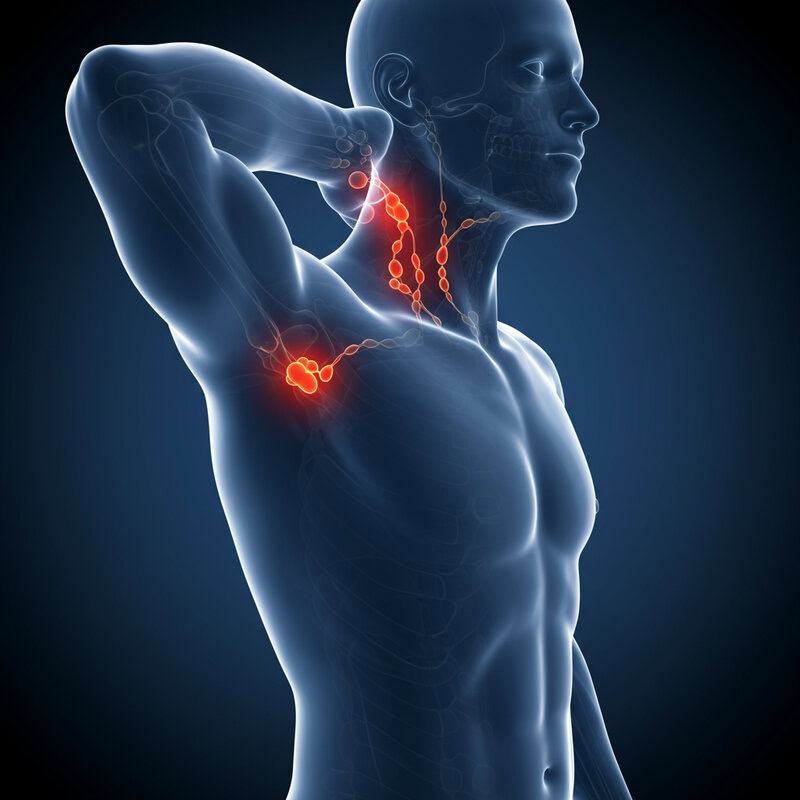
Swollen lymph nodes can occasionally be seen in individuals with vitamin B12 deficiency, reflecting stress on the immune system. B12 is essential for the production and maturation of white blood cells, which are vital for immune defense. When B12 levels are low, immune function becomes compromised, potentially leading to chronic low-grade infections or inflammation that can cause lymph nodes—especially in the neck, armpits, or groin—to become enlarged (source).
This type of lymphadenopathy is generally milder and more persistent than the acute, tender swelling seen with bacterial or viral infections such as the common cold or mononucleosis. Infection-related lymph node swelling is often associated with fever, localized pain, and rapid onset, whereas B12 deficiency-related swelling tends to be subtler and may occur alongside other signs of immune dysfunction, such as frequent infections or slow wound healing.
If you notice persistent, painless swelling of lymph nodes—especially if there is no recent illness or injury to explain it and it is accompanied by symptoms like fatigue, frequent infections, or poor wound healing—consider discussing these findings with your healthcare provider. Blood tests can help determine if an underlying vitamin deficiency or another cause is contributing to lymph node changes.
49. Difficulty Sleeping

Vitamin B12 plays a key role in the regulation of circadian rhythms and the production of melatonin, the hormone responsible for sleep-wake cycles. A deficiency in B12 can disrupt these processes, leading to difficulty falling asleep, frequent nighttime awakenings, or poor sleep quality overall (source). This impact on sleep can contribute to a vicious cycle of fatigue, irritability, and impaired daytime functioning.
Consider the experience of someone who, despite being exhausted, struggles to fall asleep or wakes up multiple times during the night without an obvious cause. They may try improving their sleep habits or using sleep aids, yet continue to experience restlessness and non-restorative sleep. These issues can persist for weeks or months, especially if underlying B12 deficiency remains unrecognized.
To help identify a possible connection to vitamin B12, try keeping a sleep diary, noting the time you go to bed, wake up, and the number of nighttime awakenings. Also record any changes in energy or mood during the day. If persistent sleep difficulties are accompanied by other signs of B12 deficiency—such as fatigue, numbness, or mood changes—discuss these patterns with your healthcare provider and consider testing your B12 levels.
50. Sudden Mood Swings

Sudden mood swings—ranging from irritability and anger to sadness or euphoria—can be a late and sometimes dramatic manifestation of vitamin B12 deficiency. B12 is essential for the synthesis of neurotransmitters that regulate mood and emotional stability, so prolonged deficiency can result in pronounced emotional instability (source). These shifts in mood may appear abruptly, be difficult to control, and can significantly impact relationships, work performance, and overall quality of life.
Unlike bipolar disorder, which is characterized by well-defined episodes of mania and depression separated by periods of normal mood, B12 deficiency-related mood swings may present without a clear pattern or a prior history of mental health issues. The emotional changes tend to improve with B12 supplementation, highlighting the biochemical roots of the symptom. However, because mood swings are also common in a range of psychiatric and medical conditions, they are easily misattributed to stress or psychological disorders.
If you or a loved one experiences new or worsening mood instability—especially alongside other neurological or physical symptoms of B12 deficiency—consider seeking both emotional support and medical evaluation. Encourage open communication, track symptoms, and advocate for comprehensive testing to ensure effective care and timely intervention.
Conclusion

Early recognition of vitamin B12 deficiency is crucial for preventing long-term health complications. While classic symptoms include fatigue and numbness, many hidden signs—such as mood changes, sleep disturbances, skin and nail changes, and neurological symptoms—can easily go unnoticed or be mistaken for other conditions. If you experience any combination of these warning signs, especially with risk factors like dietary restrictions or digestive disorders, consult a healthcare professional and consider routine screening (source). Prompt diagnosis and treatment can restore vitality, improve quality of life, and protect the health of multiple organ systems. Taking practical steps toward awareness and prevention is key to lifelong well-being.
Disclaimer
The information provided in this article is for general informational purposes only. While we strive to keep the information up-to-date and correct, we make no representations or warranties of any kind, express or implied, about the completeness, accuracy, reliability, suitability, or availability with respect to the article or the information, products, services, or related graphics contained in the article for any purpose. Any reliance you place on such information is therefore strictly at your own risk.
In no event will we be liable for any loss or damage including without limitation, indirect or consequential loss or damage, or any loss or damage whatsoever arising from loss of data or profits arising out of, or in connection with, the use of this article.
Through this article you are able to link to other websites which are not under our control. We have no control over the nature, content, and availability of those sites. The inclusion of any links does not necessarily imply a recommendation or endorse the views expressed within them.
Every effort is made to keep the article up and running smoothly. However, we take no responsibility for, and will not be liable for, the article being temporarily unavailable due to technical issues beyond our control.





